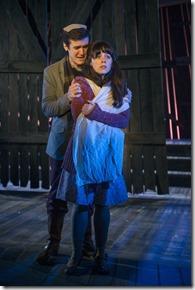
Signs of Life
Music by Joel Derfner, Lyrics by Len Schiff
Book by Peter Ullian
Directed by Lisa Portes
at VG Biograph Theater, 2433 N. Lincoln (map)
thru Oct 27 | tickets: $45-$65 | more info
Check for half-price tickets
Read review
Though inconsistent, still a gut-wrenching musical of the Holocaust
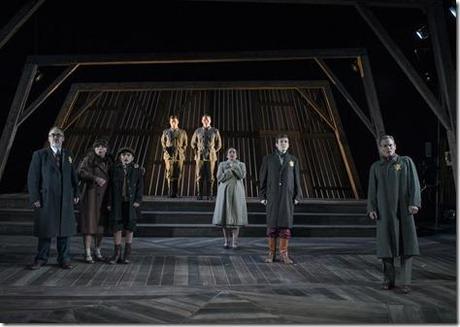
Snap-Two Productions presents
Signs of Life: A New Musical
Review by John Olson
The thought of watching a musical set in a concentration camp seems daunting to say the least, bringing fears of a “Springtime for Hitler” at worst and gut-wrenching drama at best. Thankfully, Signs of Life is never as bad as the former – though it threatens to be at points in the first act where the writers and director Lisa Portes struggle with tone. For the second act, and parts of the first, it’s frequently the latter – a horrifying story of Nazi cruelty against their Jewish captives, though one that acknowledges the strength of the human spirit. It concerns seven Jews interned in the Theresienstadt camp in then-Czechoslovakia. The camp was
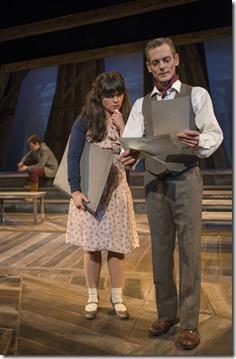
The musical opens with a group of Jews rehearsing a music hall number telling the story of the Golem: the tale of a Rabbi of the 16th Century who protected the Jews from the enemies through magic. The show, to be performed for the Red Cross inspectors, is directed by the arrogant performer/director Kurt Gerard (Jason Collins), one the internees of special interest. He’s shown to be self-centered – finding the execution of his performers or his assistant no more than inconveniences in his efforts to put on a show and trade with the Czech guards for small conveniences. The tone as this piece begins is oddly in the category of 1950’s musicals, complete with the comically arrogant director who recalls Jack Buchanan of the 1953 film “The Band Wagon”. Though we’re told the conditions in the camp are grim, with little food for the internees and unsanitary conditions that lead to disease, we have Gerard more concerned with faulty wiring interfering with the show’s lighting, a meet-cute scene between the teenagers Lorelei (Megan Long) and Simon (Matt Edmonds), and a precocious 13-year-old boy (Brennan Dougherty) who doesn’t want a Bar Mitzvah. We soon meet the Nazis – the officious Commandant Rahm (James Rank), a bureaucrat who admits he just wants trains to leave on time whether the cargo is condemned Jews or foodstuffs, and Officer Heindel, a true believer in the Nazi crusade committed to fulfilling the “final solution.” Although we meet these two at a public hanging in which they bring out the other internees to witness, Rahm and Heindel are played almost comically in these early scenes. When they assign Jacob (Michael Joseph Mitchell), one of the Jewish Council elders, to choose thousands of Jews to send east to the camps, Jacob seems insufficiently troubled by the task (even though we recognize that he lacks our knowledge that those he chooses will certainly be executed).
It’s not until late in the first act that the tone feels appropriate to the subject matter. The prisoner Berta (Lara Filip), an ethnic German who had once converted to Judaism, tells of the condition of Polish children she has cared for in the infirmary in the song, “Home Again Soon.” The number brilliantly combines a reassuring lullaby she has sung to the children with her realization that the camps from which are headed are surely extermination centers. It’s an electrifying and chilling moment, but it’s shortly followed with a misfire when the internees perform their number for the Red Cross inspector. Portes directs the peppy song in a way that seems to seek the irony of Cabaret’s Kit Kat Klub numbers but doesn’t quite succeed.
The second act, however, is nearly perfect, though extremely painful to watch, given the instances of violence shown onstage and told through dialog. Here, after, the intermission, we get very accomplished musical theater writing in which the music, lyrics and staging all heighten the emotional stakes of the piece. Act Two opens with a touching and lovely attempt at a Passover Seder by the Jews. Though they apparently have only one egg to serve as the food for their banquet, they sing of the hopes for a more proper Seder the next year. In following scenes there’s a love ballad appropriate to the circumstances (“By Your Side”) sung by Simon and a song for Lorelei (“Almost”) in which she tries to acknowledge the good in her life despite its horrifying reality. The act continues with suspense over the fate of the internees as the Nazis begin to clear the camp by transporting all remaining Jews to the East. Kurt has a big number (“To Make a Man”) in which he confronts his moral dilemma – to collaborate or not, and there’s a great ensemble number in which the Jews hide their contraband drawings around the camp, as well as a soliloquy for Heindel. In “Good,” Heindel questions the wisdom and value of his quest for “racial purity” and the song is effective in spite of its similarity of dramatic purpose to Javert’s “Stars” in Les Miserables. The final number, “Find a Way to Live” provides a honest resolution to the story, providing hope without diminishing the reality of what happened in the camps.
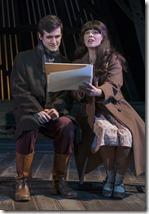 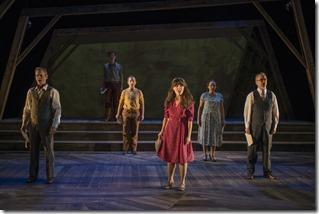
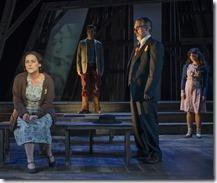 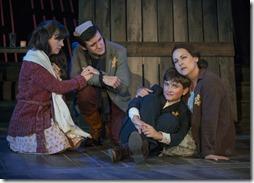 |
Joel Derfner’s music is lovely and melodic and strongly sung. It’s accompanied by a three-piece orchestra of keyboard, violin and reeds that’s perfect for the score. Len Schiff’s lyrics are smart. Peter Ullian’s book, at the end of day, certainly communicates the horrors of not just the camps, but the Nazi extermination of the Jews, even as it struggles with tone in the first act. We can understand that these tonal incongruities may have resulted from an intention to show how the internees only gradually realized the full extent of their persecution, but Ullian’s script and Portes’ otherwise visually arresting direction miss the mark in executing that possible intention. Ullian also falls short in creating fully realized character for the Jews – his Nazi’s are a little more interesting, actually. But even if his internees are a bit generic, knowing the historic truth of people like them keeps us concerned for their fate.
The production is great looking, starting with Brian Sidney Bembridge’s set of rough-hewn beams that suggest the barracks, and adding to that some judiciously used projections (many showing actual sketches from the camp) by Anna Henson. Bembridge also provides the striking lighting design. Elsa Hiltner’s costumes are suitably drab and realistic for the interned Jews.
In spite of its first act imperfections, Signs of Life, delivers a major emotional wallop. Though it celebrates the human spirit and strength of the interned Jews, it doesn’t keep the actual Nazi atrocities offstage and merely implied, like Cabaret. It brings the audience face to face with them. It’s hard to watch, but is regardless one of the many stories of the Holocaust that must be told.
Rating: ★★★
Signs of Life continues through October 27th at the Victory Garden’s Začek McVay Theater, 2433 N. Lincoln (map), with performances Wednesdays at 2pm and 7:30pm, Thursdays 7:30pm, Fridays 8pm, Saturdays 5pm/8:30pm, Sundays 3pm. Tickets are $45-$65, and are available by phone (773-871-3000) or online through their website (check for half-price tickets at Goldstar.com). More information at SignsOfLifeTheMusical.com. (Running time: 2 hours 20 minutes, includes an intermission. Recommended for ages 12 and up.)
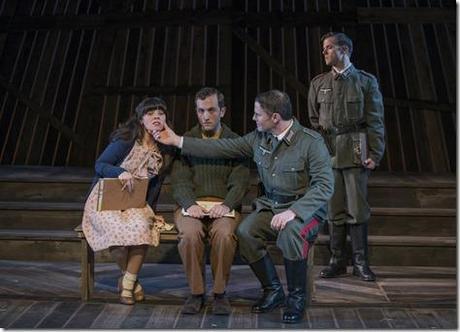
Photos by Michael Brosilow
artists
cast
Jason Collins (Kurt Gerard), Nathan Cooper (Jonas, Red Cross Inspector, Russian), Brennan Dougherty (Wolfie Schumann), Matt Edmonds (Simon Müller), Lara Filip (Berta Pluhar), Megan Long (Lorelei Schumann) Michael Joseph Mitchell (Jacob Schumann), Doug Pawlik (Officer Heindel), James Rank (Commandant Rahm)
musicians
Mike Pettry (musical director, keyboards), Andrew McCann (violin), Sean McNeely (reeds)
behind the scenes
Lisa Portes (director), Mike Pettry (musical director), Brian Sidney Bembridge (scenic and lighting design), Elsa Hiltner (costume design and construction), Mikey Moran (sound design), Anna Henson (projection design), Julia Neary (choreographer), Paul Bogaev (music supervisor), Christian Imboden (orchestrations), Scott Miller (production manager), Tina M. Jach (stage manager), Kelsey Lamm (asst/ stage manager), Michael Brosilow (photos)
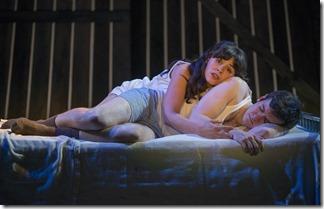
13-0949

